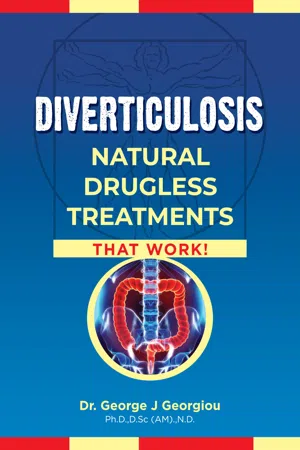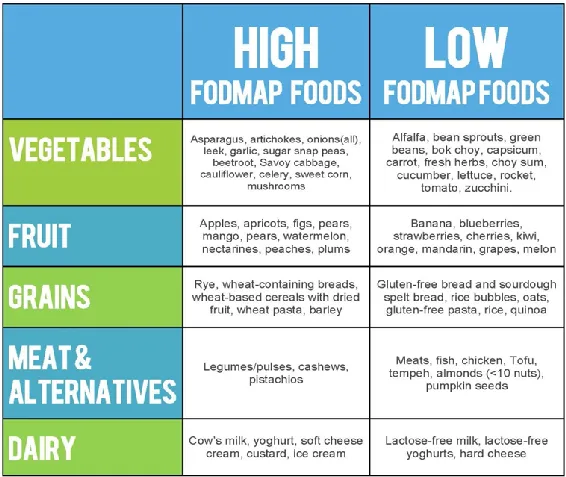
- English
- ePUB (mobile friendly)
- Available on iOS & Android
eBook - ePub
About this book
Many people are told by their doctors that they must “live” with their Diverticulosis without guidance on how to cure it. Dr Georgiou has personally treated hundreds of cases of Diverticulosis successfully using the Da Vinci Natural Diverticulosis Protocol devised by himself. The underlying causative factors such as food intolerances, chronic inflammation, dysbiosis, SIBO, leaky-gut, digestive issues, Candida, parasites and more can be maintaining your Diverticulosis and this book explains in a simple-to-follow way how to eliminate these causes.
Frequently asked questions
Yes, you can cancel anytime from the Subscription tab in your account settings on the Perlego website. Your subscription will stay active until the end of your current billing period. Learn how to cancel your subscription.
No, books cannot be downloaded as external files, such as PDFs, for use outside of Perlego. However, you can download books within the Perlego app for offline reading on mobile or tablet. Learn more here.
Perlego offers two plans: Essential and Complete
- Essential is ideal for learners and professionals who enjoy exploring a wide range of subjects. Access the Essential Library with 800,000+ trusted titles and best-sellers across business, personal growth, and the humanities. Includes unlimited reading time and Standard Read Aloud voice.
- Complete: Perfect for advanced learners and researchers needing full, unrestricted access. Unlock 1.4M+ books across hundreds of subjects, including academic and specialized titles. The Complete Plan also includes advanced features like Premium Read Aloud and Research Assistant.
We are an online textbook subscription service, where you can get access to an entire online library for less than the price of a single book per month. With over 1 million books across 1000+ topics, we’ve got you covered! Learn more here.
Look out for the read-aloud symbol on your next book to see if you can listen to it. The read-aloud tool reads text aloud for you, highlighting the text as it is being read. You can pause it, speed it up and slow it down. Learn more here.
Yes! You can use the Perlego app on both iOS or Android devices to read anytime, anywhere — even offline. Perfect for commutes or when you’re on the go.
Please note we cannot support devices running on iOS 13 and Android 7 or earlier. Learn more about using the app.
Please note we cannot support devices running on iOS 13 and Android 7 or earlier. Learn more about using the app.
Yes, you can access Diverticulosis by George John Georgiou in PDF and/or ePUB format, as well as other popular books in Medicine & Alternative & Complementary Medicine. We have over one million books available in our catalogue for you to explore.
Information
Diverticulosis
Natural Drugless
Treatments
That Work!
Dr George J Georgiou, Ph.D.,N.D.,D.Sc (AM)
Dedication
First, I would like to bow deeply to the thousands of patients who have helped me understand the complexities of this disease process and who need to take credit for the time spent with them in refining this protocol over many years.
All these patients over the years have been my “laboratory” for developing many treatment protocols through trial and error, backed by research.
I would also like to thank all the researcher scientists, lecturers and teachers who dedicate their life to helping others, and all the courageous health professionals who go against the grain of the establishment, while thinking outside the box.
A loving hug of gratitude to my wife and 4 children for their support and understanding during my professional endeavours throughout these years – they are all blessed.
Finally, I deeply embrace the Divine faith that I have been blessed with, that has helped me believe in the innate healing abilities of the body, through the power of Natural healing, without chemical intervention.
A profound blessing to you all and may your healing journey be fruitful and fulfilling!
Copyright © 2018 Dr. George J. Georgiou. All rights reserved. No portion of this book, except for brief review, may be reproduced, stored in a retrieval system, or transmitted in any form or by any means—electronic, mechanical, photocopying, recording, or otherwise—without the written permission of the publisher.
For information contact Da Vinci Health Publishing – [email protected].
Published by:
Da Vinci Health Publishing
Panayia Aimatousa 300
Aradippou 7101
Larnaca
Cyprus

MEDICAL DISCLAIMER: The following information is intended for general information purposes only. Individuals should always see their health care provider before administering any suggestions made in this book. Any application of the material set forth in the following pages is at the reader’s discretion and is his or her sole responsibility.
ISBN - 978-9925-569-19-9
Contents
Chapter 1: The Da Vinci Diverticulosis Treatment Protocol
Chapter 2: The Holistic Model of Health
Chapter 3: Toxicity: Underlying Cause of All Diseases
Chapter 4: Detoxification: The Health Secret of all Time
Chapter 5: Food Intolerances, Inflammation and Disease
Chapter 6: Candida: A Universal Cause of Many Diseases
Chapter 7: Curing with Energetic Medicine and Bioresonance
Chapter 8: Emotional, Psychological & Spiritual Roots of Disease
Disclaimer
Summary and Concluding Remarks
ABOUT THE AUTHOR
More Books written by Dr Georgiou:
Chapter 1: The Da Vinci Diverticulosis Treatment Protocol
Introduction
Diverticular disease of the colon is among the most prevalent conditions in western society. It is among the leading reasons for outpatient visits and causes of hospitalization. While previously considered to be a disease primarily affecting the elderly, there is increasing incidence among individuals younger than 40 years of age. Diverticular disease most frequently presents as uncomplicated diverticulitis, and the cornerstone of management is antibiotic therapy and bowel rest.

Epidemiology and Prevalence
Diverticular disease is least prevalent in younger age groups and most prevalent as people age. Specifically, up to age 40 we find about 5% of the general population will have diverticular disease. Up to age 60, this will increase to 30%, and up to age 80 it will go up to 65%. Under the age of 50, it is more common in males, but after the age of 50 it is more common in females.
The incidence of diverticular disease has increased over the past century (Etzioni et al, 2009; Warner et al, 2007; Painter et al, 1971). Autopsy studies from the early part of the 20th century reported colonic diverticular rates of 2% -10% (Painter et al, 1971). This has increased dramatically over the years. More recent data (Warner et al, 2007) suggests that up to 50% of individuals older than 60 years of age have colonic diverticula, with 10% - 25% developing complications such as diverticulitis.
Hospitalizations for diverticular disease have also been on the rise. According to an American study evaluating hospitalization rates between 1998 and 2005 (Etzioni et al, 2009), rates of admission for diverticular disease increased by 26% during the eight-year study period. Similar trends have been observed in Canadian and European data over the same time period (Warner et al, 2007; Kang et al, 2003).
Diverticular disease has long been regarded as a disease of western countries. The highest prevalence of this condition is in the United States, Europe and Australia, where approximately 50% of the population 60 years of age and older have diverticulosis (Warner et al, 2007; Painter et al, 1971). This common occurrence is in contrast to that of the developing world, where countries in Africa and Asia have prevalence rates of less than 0.5% (Painter et al, 1971; Parks et al, 1975; Rege et al, 1989).
The western diet, particularly its deficiency in dietary fibre, has long been implicated as a causative factor for these geographical variations (Painter et al, 1971; Burkitt et al, 1972; Aldoori et al, 1994). This hypothesis was supported by a study that compared stool weight and transit time in 1,200 individuals in the United Kingdom and rural Uganda (Burkitt et al, 1972).

Fig 1. Dr Burkitt – Diet is the key!
The United Kingdom subjects, who were shown to have lower fibre intake, had a transit time of 80 hours and a mean stool weight of 110 g/day. This was significantly lower than in the Ugandan subjects, who had much shorter transit times (34 hours) and greater mean stool weights (450 g/day). The prolonged transit time and small stool volumes were believed to predispose to diverticular disease by increasing intraluminal pressure – basically, the person had to strain under pressure to release the stools, something that will set the scene for diverticular disease.
Moreover, there is growing evidence that the rates of symptomatic diverticular disease are on the rise because areas in the developing world are becoming increasingly westernized (Walker et al, 1979; Ogunbiyi et al, 1989).
For example, the rates of diverticular disease have increased among urban black populations of South Africa compared with rural black populations in the same country (Walker et al, 1979). The role of dietary fibre deficiency as a contributor to diverticular disease was further supported by a large prospective cohort study of more than 47,000 men who were followed over a four-year period (Aldoori et al, 1994). Dietary fibre intake was found to be inversely associated with the risk of developing diverticular disease.
Diverticulosis, Diverticular Disease and Diverticulitis
The terms diverticulosis, diverticular disease and diverticulitis are often used synonymously but there are differences which need to be pointed out:
Diverticulosis
"Diverticula" is the medical term used to describe the small bulges that stick out of the side of the large intestine (colon). The presence of these diverticula is called diverticulosis. Diverticula are common and associated with ageing. The large intestine becomes weaker with age, and the straining and pressure of hard stools passing through the large intestine is thought to cause the bulges to form.
Diverticular disease
One in four people who develop diverticula will experience abdominal pain. Having symptoms associated with diverticula is known as diverticular disease. Othe...
Table of contents
- Chapter 1: The Da Vinci Diverticulosis Treatment Protocol